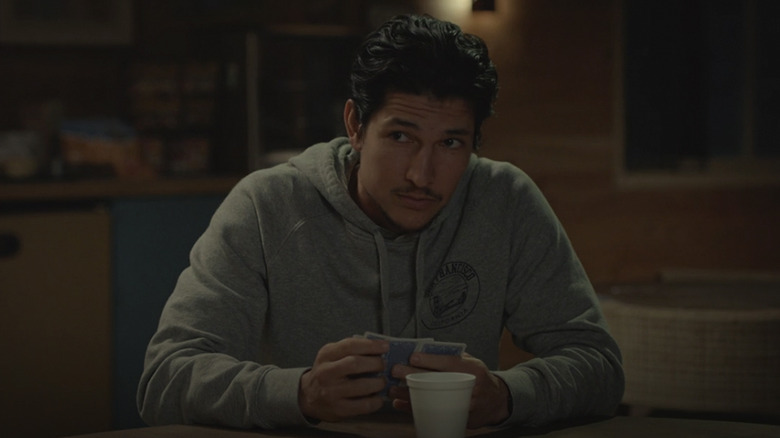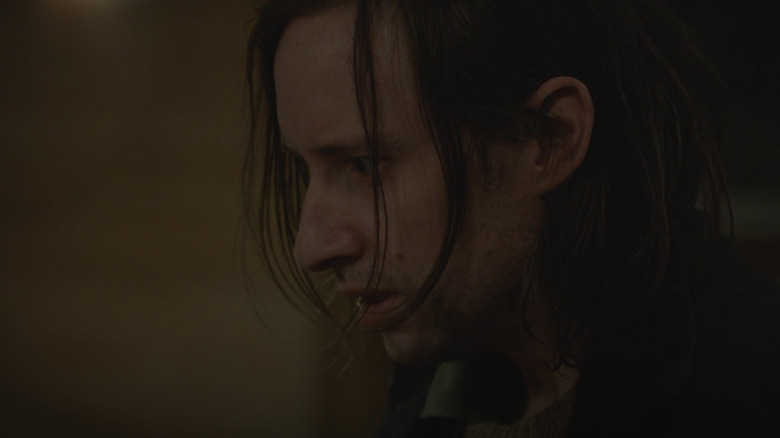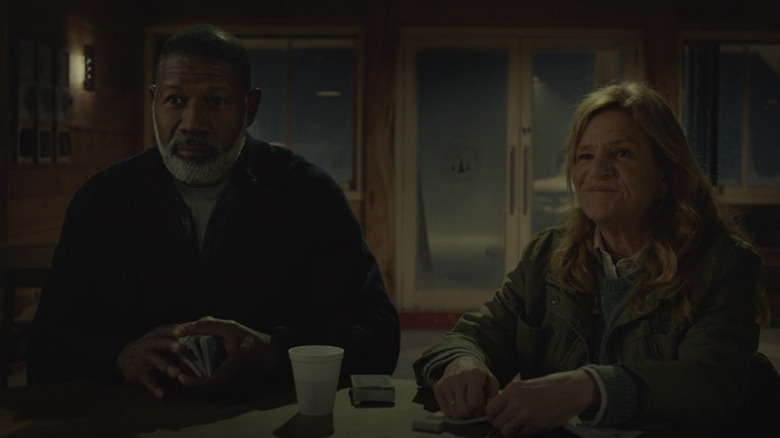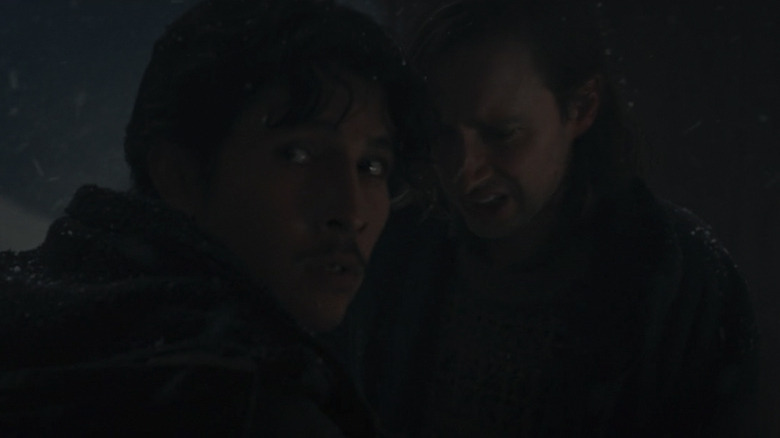No Exit Actors Danny Ramirez And David Rysdahl On Learning From Their Veteran Co-Stars [Interview]
There's a mystery baked into the premise of "No Exit," the nasty little thriller which debuted on Hulu this past weekend. When Darby (Havana Rose Liu) takes refuge from a blizzard at a mountainside visitor center, she discovers a kidnapped little girl trapped in a van in the parking lot. One of the four other travelers at the center is hiding something, and the movie is arguably at its most effective as Darby tries to suss out the truth.
To have a conversation with the cast of a film like this, I needed to step beyond the confines of the film's premise and dig into some specifics, which is exactly what happened when I spoke with actors Danny Ramirez and David Rysdahl. They told me about learning from their veteran co-stars Dennis Haysbert and Dale Dickey, one of the movie's biggest set pieces, losing money in poker games between takes, and more, so consider this a spoiler warning for the events of "No Exit."
'The audience is figuring out with the characters how we all got to be where we are.'
The dynamic that you guys have here is kind of a familiar one. I thought a little bit about Lennie and George from "Of Mice and Men" a little. But in crime fiction, you often see this sort of brotherly relationship like this, where one character feels a certain level of responsibility for the other. I was wondering if you guys discussed that at all when you first met and started talking about these characters.
Ramirez: I think it was a really fun place to explore because ... "Of Mice and Men," I got to see it on Broadway, and there was so much amazing inspiration from that in the rest of my career that it was so cool to play a dynamic of non-paternal sibs, if you will. So much of that was the trust between David and myself to build on, and then to build our history, and then to know that so much of our performances hinge on each other in some capacity. I know so much of the humanity of Ash did lie in Lars's character and what he stood for. But it helped so much with what I had to bring to the table, and it was just wonderful to prepare with David in that.
Rysdahl: Yeah. We all would go out and have dinner and kind of all put the pieces together, how all of our characters got to that place. Because so much of this movie takes place off screen, the audience is figuring out with all the characters how we all got to be where we are. I think as actors, that was really essential for us to kind of figure out the story and then deepen our [relationships]. We got really personal. As a cast, we got very close. They're all lovely people, but the script, to do it right, you had to go to these really intense places. I think being real with each other early on as people first allowed us to have the trust to go there.
David, your character is one of the trickiest ones in the movie because there's a risk of balancing innocence and a kind of simpleness, and so I'm curious how you approached that and what kind of conversations you had with Damien there about finding the right balance.
Rysdahl: Yeah, I was really worried about that, actually. Damien and I had a brunch where we talked it out for like five hours. For me, the key was trauma. He's a normal person with a lot of trauma that's gone through his life. So for me to go and play this person, it really was creating a very intense backstory about where I came from, who my relationships were, how I got to be where I was. I'm being so vague, but for me, that's how I played it in my body. All the body stuff shows this other life of how I got to where I was and the speech, all that came after that conversation with Damien. I'm like, "Is this character, is he not that intelligent? Is he simple in a way?" That can be stereotypical and just boring and honestly offensive at places, and I wanted to stay away from that while also exploring what this character's been through. For me, that was the balance, to find that place. It was more about trauma than it was about being simple.
'Dennis and Dale were a massive reason why it worked the way it did.'
So you guys had the opportunity to work with a pair of beloved veteran actors, Dennis Haysbert and Dale Dickey, and I'm curious what you learned watching them work.
Ramirez: Well, first of all, them being the most experienced on set and being phenomenal actors, they also took that responsibility and everything that they passed down to us and then the way that they led into the space really set for a wonderful place to play. Alongside Damien guiding us through this, and actually Havana as well, they basically, as leaders of the pack, really set the tone. But Dennis and Dale were just lovely to work with. The moment they'd yell cut, and we'd go back and hang around the trailers, they made the atmosphere feel so familial. Dale would be setting up our excursions on the outside, and Dennis would be taking our money playing poker inside. So I think the safety of it all, that net to really be able to play was the biggest takeaway. Not necessarily being guided with, "This is what you should be doing" — which was also there, everyone was very respectful about that. But instead, they created just a really safe place for you to try and fail and try again. I think their experience shone through in that because by the end, every single time we were at dinner, it was like a beautiful reset to step away from this arena of death, or as David calls it, a snow globe from hell. Then Damien would shake it up and we'd all be chaotic. But Dennis and Dale were a massive reason why it worked the way it did and we were able to go to the places we had to go to. Dennis, we stayed for each other's scenes and read opposite in days that he wasn't called, and he'd be on the microphone yelling his lines, trying to incite and provoke some stuff to come out from different characters. I won't spill who. But then he'd be just dancing [between takes]. He'd just be doing whatever to rile you up, and that was a lot of fun.
I actually just spoke with Dennis, and he mentioned those poker games. David, was Dennis the one who ended up winning the most of those? Who ended up with the most money there?
Rysdahl: Oh, yeah. I think Danny lost the most, and I was the middle. I –
Ramirez: It went back and forth. There was one day that I paid — remember you got everyone smoothies? I think you got so much money from me. My money paid for all these smoothies, and the next day I won that money back.
Rysdahl: I know, I know. I bought the smoothies for the crew, so it was on Danny. [laughs] But no, they both are so selfless as actors. I think sometimes you come in and you're like, "These people have been in there for a lot longer. They could be jaded or have big egos," and there was none of that. They were just actors with us, and I think that was really good for me to just remember. That was a big lesson. Any level you're at, we're all just here in this moment trying to make some good art and trying to make a good story, and they really embodied that and were so giving, as Danny just said.
'I have nightmares.'
I want to ask you about that "nail through the wrist" moment. What was that like for you, Danny, to participate in, and then for you, David, to be there for something that intense on set?
Ramirez: Well, I think the nail gun plays a very intense role in the film. I think both [nail gun scenes] are equally as traumatizing, but there was so much preparation going into that whole scene from the top of the scene where we barge in, to towards the end where she's put in that position, but there was so much trust in being able to go there. Havana absolutely annihilated every step of the way. Every time we did a scene, there was surprise after surprise as to what she was bringing to the table. In that moment, I remember just once the scene was over, it's just like seeing her face go through that really just was scarring, because it's like, "Oh, did I actually do that?" It was just so unbelievably raw and guttural and believable. It made me just look at my own wrist and see damage that could be done to it based on just seeing her face go through it.
Rysdahl: I have nightmares. [Laughs] No, I think honestly so much of this movie, I didn't have to do much acting. Because we shot it in order, so you experienced the film with the crew, and all the memories we made of the day before were still lingering the next day, so we'd come in, and I'd be like, "Oh, yeah, I'm already feeling yesterday in my body." So in some ways the acting, you could let that go and just be like, "Well, I know what that is. Let me just go with the real."
"No Exit" is currently streaming on Hulu.



